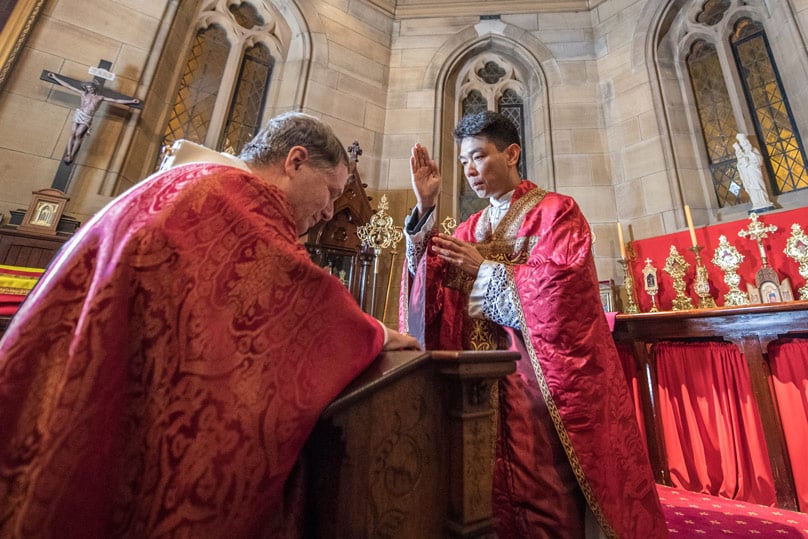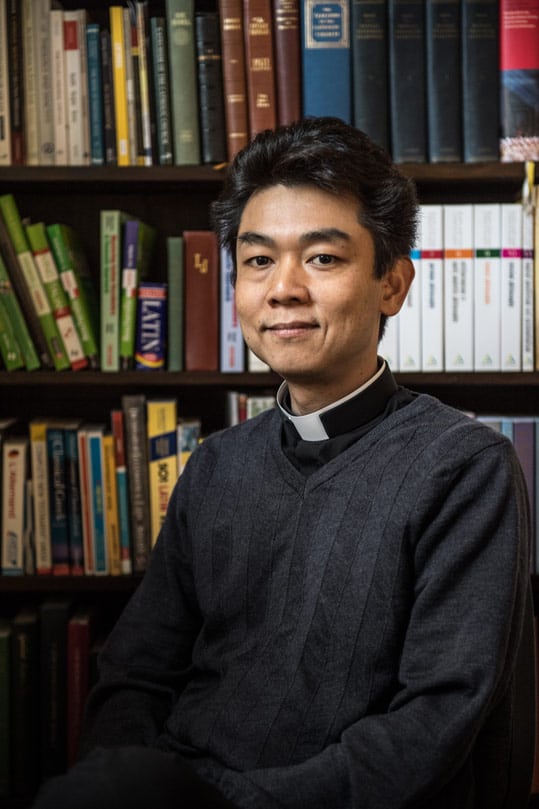
“I always believed I was studying God by doing physics,” says Fr Sebastian Hew, a newly ordained priest and physicist with a doctorate from Cambridge University.
Ordained to the priesthood for the Sydney Archdiocese in August this year, Fr Hew says his belief in God was never problematic during his career as an experimental physicist and he finds no conflict between scientific knowledge and religious faith.
“To me there’s no conflict between faith and science because science is the study of creation: in particular, the material aspect of creation,” said the young priest who is currently Assistant Priest at Sacred Heart Parish in Mosman.
Contrary to the popular view promoted by people such as Richard Dawkins, that scientific knowledge renders belief in God redundant, Fr Hew pointed out that there is a limit to what science can tell us about existence.
“There’s a spiritual world as well as a material world and science only has access to the material. There are many things science can’t explain. Consciousness for instance.”
He said science also can’t explain how the world came into being, even if the ‘Big Bang Theory’ is true.
“It’s outside the purview of science because time and space began with the Big Bang. The universe didn’t exist before the Big Bang, in which case, how did it start? Physics is the investigation of space and time really, so it’s not a question that science can necessarily answer.”

Although his work as a physicist didn’t make him feel closer to God, Fr Hew believes it is possible to learn about God through studying his creation.
“To me creation is one and I feel that physical research is a way of coming to know creation better. If we know creation better, we know God better.”
He also says rational arguments for the existence of God, such as those from St Thomas Aquinas and St Anselm, have never been important to his own faith.
“I find all these proofs of God’s existence to be flawed in some way. I suppose God has given me the gift of faith in another way so that I don’t need to rely on those sorts of proofs and ultimately I think you believe in God not through intellectual reasoning, you’re not reasoned into it.”
“Also, you can’t prove God’s existence through rational arguments because there is that element of a leap of faith that’s required. If you can prove that God exists, well then faith is no longer necessary.”
Of Chinese ethnicity, Fr Hew was born in Malaysia and came to Australia with his parents when he was ten years old.
He grew up in Perth and went on to study electrical engineering at UNSW in Sydney. He obtained a scholarship to undertake a doctorate in condensed-matter physics at Cambridge University and it was during his studies there that his faith in God deepened.
Ironically, it was a comment from his doctoral supervisor that made Fr Hew realise that physics was not his passion and that only God could satisfy him.
While conducting an experiment one day, his supervisor decided to give Fr Hew a pep talk as they sat in front of a computer saying to him, “Sebastian you have to be passionate about what you’re doing. You can’t just think of it as so many electrons you’re chasing around on a screen. You have to live and breathe your experiment, live and breathe the device and you have to think of it as divine.”
“When he said that I thought to myself, well, there’s only room in my life for one thing that’s divine, and that’s God. I realised my passion was not for physics. I enjoyed physics and I did rather well but that wasn’t where my heart lay.”
As a baptised Anglican, Fr Hew regularly attended the Anglican liturgy at St John’s College, Cambridge, and eventually became head server there.
He experienced his first Catholic Mass at the college chapel, which despite being Anglican, was used once a year by Catholics to celebrate the Tridentine Mass.
“I found it incredibly moving. It was an indescribable sense of the beauty of creation, the beauty of God, and the presence of God. That Mass did leave a deep impression. There was something different about this Mass. Something sort of carried me away.”
He went on to read the Catechism of the Catholic Church and after much prayer and discernment approached a Catholic priest on Ash Wednesday 2008 for instruction in the faith. From there things moved rapidly. He was received into the Catholic Church later the same year and applied to enter Sydney’s Good Shepherd seminary in late 2009.
When he looks back in hindsight, Fr Hew says God was calling him to priesthood for a long time but he hadn’t recognised the call. “God had already been tugging on my heart. Looking back I can see that was a call to priesthood.”
His ordination in August this year was such a momentous occasion, that Fr Hew says he was trembling throughout the ceremony.
“The most moving part was the prayer of ordination. I was kneeling and the Archbishop was singing the Prayer of Ordination. I was trembling throughout. I guess you could say that was the moment of truth and it felt right. Even though I was trembling there was a certain feeling of peace and rightness about it that reassured me.”
It could be said that Fr Hew has gone from studying the physical world in his life as a physicist, to studying the spiritual world now in his vocation as a priest. He is following in a long line of Catholic priests-scientists who found that studying creation through science is also a way of studying the Creator.
“If we know creation better, we know God better,” Fr Hew says.
“As St Paul says in Romans; from the visible things, we will know the invisible things of God.”
